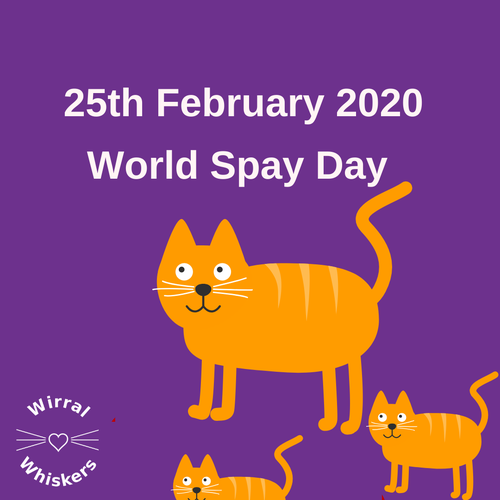World Spay Day - 25th February 2020
February is Spay/Neuter Awareness month with World Spay Day taking place on the 25th February 2020. Do you know why this is necessary?

World Spay Day
February is Spay/Neuter Awareness month with World Spay Day taking place on the 25th February 2020. This is an important day to raise awareness of the need to neuter and spay their pets. Neutering is always promoted as a part of responsible pet ownership, but do you know why?
Why Neuter?
There are many reasons why you should neuter your animals! It is one of those things that I know should be done, primarily to reduce the amount of extra animals needing homes. There are many more reasons for neutering and I've tried to write them briefly here.
- Unwanted offspring - It is hard to find good homes for all the pets. Cats can come into season a week after giving birth! Animal shelters are full of animals needing homes. Animal rescue groups are kept busy with stray pets. Often unwanted pets are dumped which creates suffering for them.
- Care of young - Having a pregnant animal means there are extra food costs and perhaps veterinary costs. Then once the young begin to be weaned, there will be extra food costs.
- Reduce stress from recurring heat/season cycle.
- Reduce false pregnancies - this means that the animal experiences the side effects of pregnancy such as tiredness, nausea, appetite changes, weight gain and altered behaviour.
- Possible inbreeding - This can take place between parent and young or between siblings. (I had experience of this when my mice decided to breed at five weeks old rather than six weeks like the books said.) Inbreed animals are at risk of genetic flaws being amplified.
- Reduce illnesses - having pets spayed means that they are less likely to get womb infections or uterine and mammary cancers. If males are neutered, they are at less risk of prostrate cancers. Sexual transmitted diseases are prevalent in animals that aren't neutered.
- Less 'marking' behaviour - if male cats aren't neutered, they like to mark their territory. Due to the hormone levels, the urine fragrance of an entire pet is strong and distinctive.
- Less likely to roam - cats and dogs will do everything that they can to find a mate including escaping and roaming.
- Less aggression - either at the owner as the animal wants to get out. Alternatively the pet may be aggressive to other animals getting in the way of finding a mate.
- Less stress for the owner - in summary, neutering means less stress, hassle and cost for the owner.
The Neutering Procedure
The term 'neutering' means the part or complete removal of the reproductive organs and refers to the procedure for both males and females. Due to the nature of the operation, the male neutering procedure is a shorter operation than the female version of neutering.
The procedure for females is called a 'spay'. When an animal is spayed, the womb and ovaries are removed. If you would like to see a video of a cat spay, please click here. (Beware, if you are squeamish don't watch this video.)
Generally for males, the term is castration for the removal of the testicles. If you would like to see a video of the castration procedure, please click here. There are a lot more videos available online if you are interested.
Cost of Neutering
The price of neutering varies on the vets practice charges, as well as the amount of medicine and equipment required. The Cat's Protection said that the cost of neutering cats can be between £40 to £100 and they have schemes where they can help with the costs. More information can be found here.
The Blue Cross said that neutering a dog costs between £100 to £400. Again the cost depends on whether a spay or castration and the size of the dog.
The cost for smaller animals such as rabbits or ferrets is usually in line with the cost of cat neutering.
The advantages of getting a pet neutered really outweighs the cost of neutering.
Cat Rescues - Feral Cats
Before I had children I volunteered with a local cat rescue and fostered cats. This was an amazing experience as at that time I didn't have a cat of my own. I loved looking after the families until they got new homes. The rescue owner really wanted to help all cats and she went up to Clatterbridge daily to feed the feral cats. She was also involved in trapping the feral cats to get them neutered before returning them. This was to help keep down the feral population. This is such an amazing thing to do as reduces the amount of unloved and uncared for cats reducing the suffering.
When I was growing up, there were often stray cats around. My dad used to count the tins of cat food to see how many my mum was feeding. We still laugh about this now.
We currently live in a on a busy road in a built up area and very rarely see stray cats. In fact, I don't see many cats. If I do see one in the garden, it is a rarity and I go out with the cat biscuits. Usually the cats are too quick and run away.
